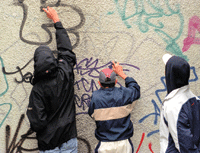
A funding row over youth offending teams (YOTs) could see children’s social workers taking on increased workloads, Community Care has learned.
The Youth Justice Board has confirmed that the central funding pot for YOTs, which makes up 30% of the funding for teams, has yet to be decided despite councils having to finalise their budgets over the next few weeks. The rest of YOT funding comes from local councils and their partners including police and health to reflect the multi-agency and multi-disciplinary nature of the teams.
The central funds used to come from the Ministry of Justice, the Department for Education and the Home Office. However, there are rumours that there is wrangling among ministers over how much each department will contribute to a single pot distributed by the Ministry of Justice in future.
An MoJ spokesman confirmed the funding formula was still “currently under consideration”.
“Funding for youth crime prevention work comes from a number of local and national sources. We are working with other departments and agencies to secure significant investment in prevention going forward. As part of the Sentencing Green Paper proposals we are considering how we can introduce elements of payment by results into the delivery of youth justice services. In particular, we are exploring how we can use the youth custody budget to incentivise improved performance by local authorities.”
Andrew Webb, ADCS policy lead on youth offending, said: “We are very concerned at the lack of information about the YOT grant. We fear it is because there is confusion within government about the funding for YOTs and hope that it is not a symptom of a wider confusion regarding responsibility for policy regarding young people who offend, or the end of a unified and holistic approach to services for this vulnerable group. The late announcement will make whatever reduction in funding is to be imposed much harder to manage and consequently likely to have a bigger negative impact on service to young offenders and the criminal justice system.”
Many councils are proposing drastic cuts to their YOTs. Trafford Council is cutting £370,000 from its youth offending team, while Hammersmith and Fulham, Westminster and Kensington and Chelsea in London have together made cuts of 21%, slashing £432,000 from their merged YOT budget. As previously reported in Community Care the London Borough of Newham is planning to merge its YOTs with children’s social care teams with vulnerable children being allocated either a social worker or a YOT worker, but not both. Where there are child protection concerns, it is likely children’s social workers will take the lead.
Mike Thomas, of the Association of YOT Managers said it was not unusual for the YJB to make a late announcement on the funding but usually they would tell councils to make assumptions funding would be similar to previous years.
“They haven’t said that this year and obviously with the need to make cuts councils need to know. That’s the problem with funding coming from so many different departments and agencies, it does leave YOTs very vulnerable to cuts, particularly because they’re not very good at highlighting the savings they are making from their prevention work.” He said some councils were also susceptible following the ending of funding under the Youth Crime Action Plan and cuts to other initiatives such as those to reduce gang violence.
The news follows a public accounts committee report published earlier this month which found a third of assessment and sentence plans undertaken by youth offending teams were not good enough and the YJB had limited evidence of which interventions worked best with young offenders “making it difficult to achieve better value for money from the £800m spent in the system”.
“Without evidence of effectiveness, there is a risk that reductions in funding for frontline services could result in cuts to the most successful interventions. The ministry told us that prevention budgets were certain to be cut in future years, at both national and local level, due to general reductions in budgets and the non-statutory nature of prevention work. The ministry believed that cuts to prevention funding would lead to higher costs in the medium term,” the report said.
What do you think?Join the debate on CareSpace
Keep up to date with the latest developments in social care. Sign up to our daily and weekly emails
Related articles
Council’s social workers may deal with young offenders alone
Closer ties between YOTs and social workers heralded
YJB to be scrapped in quango reforms
Inform subscribers
Guide to jointly delivering services: Youth offending teams and children’s social care



 Bournemouth, Christchurch and Poole
Bournemouth, Christchurch and Poole  Hampshire County Council
Hampshire County Council  Oxfordshire County Council
Oxfordshire County Council  South Gloucestershire Council
South Gloucestershire Council  Wokingham Borough Council
Wokingham Borough Council  Webinar: building a practice framework with the influence of practitioner voice
Webinar: building a practice framework with the influence of practitioner voice  ‘They don’t have to retell their story’: building long-lasting relationships with children and young people
‘They don’t have to retell their story’: building long-lasting relationships with children and young people  Podcast: returning to social work after becoming a first-time parent
Podcast: returning to social work after becoming a first-time parent  How managers are inspiring social workers to progress in their careers
How managers are inspiring social workers to progress in their careers  Workforce Insights – showcasing a selection of the sector’s top recruiters
Workforce Insights – showcasing a selection of the sector’s top recruiters  Unlocking independence: how ASDAN gives care leavers choice and control over their future
Unlocking independence: how ASDAN gives care leavers choice and control over their future 

 Facebook
Facebook X
X LinkedIn
LinkedIn Instagram
Instagram
Comments are closed.